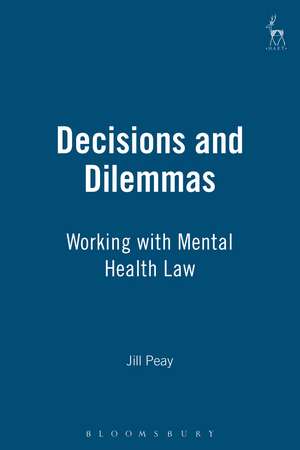Decisions and Dilemmas: Working with Mental Health Law
Autor Professor Jill Peayen Limba Engleză Paperback – 2 iun 2003
Preț: 304.55 lei
Nou
Puncte Express: 457
Preț estimativ în valută:
58.28€ • 63.29$ • 48.96£
58.28€ • 63.29$ • 48.96£
Carte tipărită la comandă
Livrare economică 23 aprilie-07 mai
Preluare comenzi: 021 569.72.76
Specificații
ISBN-13: 9781841133430
ISBN-10: 1841133434
Pagini: 238
Dimensiuni: 156 x 234 x 12 mm
Greutate: 0.34 kg
Ediția:New.
Editura: Bloomsbury Publishing
Colecția Hart Publishing
Locul publicării:London, United Kingdom
ISBN-10: 1841133434
Pagini: 238
Dimensiuni: 156 x 234 x 12 mm
Greutate: 0.34 kg
Ediția:New.
Editura: Bloomsbury Publishing
Colecția Hart Publishing
Locul publicării:London, United Kingdom
Caracteristici
In the field of mental health law, we entrust decisions with consequences of the utmost gravity. Yet, how do these non-lawyers make decisions where the legitimacy of those decisions derives from law?
Notă biografică
Jill Peay is a Reader in the Department of Law at the London School of Economics and Political Science.
Cuprins
1. Robert Draper: A Case for Admission?2. Clive Wright: A Case for Discharge?3. Hazel Robinson: A Case for Compulsory Treatment?4. Decision-making Research: Context and Content5. Legal and Policy Context6. Conclusions
Recenzii
In her foreword, Lady Justice Hale (as she then was) describes this book as 'fascinating' and 'a stimulating read'. This reviewer unreservedly agrees.In summary, this book deserves to be read and considered by all who care about, and debate, the direction of mental health law, not least of course by those faced with the responsibility of devising the appropriate, ethical and practical legislation of the future.
Jill Peay's fascinating book provides an in-depth look into the way approved workers and psychiatrists use the law to make decisions about compulsory admissions and treatment..this is a useful resource for social workers and psychiatrists who want to develop their skills in applying the law and better understand the process they are part of.
This book fills an important gap and will provide the reader with many insights into the nature of decision-making in the mental health context.
At a time when a great deal concerning mental health law, ethics and practice is in the melting pot, this book makes a highly-distinctive and welcome contribution to the debate taking place. A short review cannot do justice to the rich (and sometimes disquieting) material contained in Peays careful critical analysis. The manner in which the mental health professionals in her sample reached their decisions is described in meticulous and fascinating detail. In her foreword to the book, Lady Justice Hale (who will be known to many readers in her former academic role as Brenda Hoggett), describes the book as fascinating, a statement which I echo wholeheartedly. I think this book is a must for all who are thoughtful about the compulsory powers afforded in the current mental health legislation.
This is a timely publication in light of the continuing uncertainty surrounding the future direction of mental health reform..there are positive and important lessons to be learnt from Decisions and Dilemmas...it makes an important contribution to the ongoing debate about the shape of a new Mental Health Act by providing stimulating and valuable insights into non-legal practitioners' attitudes to, and application of, the mental health legislation....the book will primarily be of interest to those who work with and research mental health law and policy, it..also [has] broader appeal for those who are interested generally in the process of multi-disciplinary decision-making in a quasi-legal field, the impact of research on practice and the effectiveness of the law as a means of achieving change and influencing practice.
Jill Peay's fascinating book provides an in-depth look into the way approved workers and psychiatrists use the law to make decisions about compulsory admissions and treatment..this is a useful resource for social workers and psychiatrists who want to develop their skills in applying the law and better understand the process they are part of.
This book fills an important gap and will provide the reader with many insights into the nature of decision-making in the mental health context.
At a time when a great deal concerning mental health law, ethics and practice is in the melting pot, this book makes a highly-distinctive and welcome contribution to the debate taking place. A short review cannot do justice to the rich (and sometimes disquieting) material contained in Peays careful critical analysis. The manner in which the mental health professionals in her sample reached their decisions is described in meticulous and fascinating detail. In her foreword to the book, Lady Justice Hale (who will be known to many readers in her former academic role as Brenda Hoggett), describes the book as fascinating, a statement which I echo wholeheartedly. I think this book is a must for all who are thoughtful about the compulsory powers afforded in the current mental health legislation.
This is a timely publication in light of the continuing uncertainty surrounding the future direction of mental health reform..there are positive and important lessons to be learnt from Decisions and Dilemmas...it makes an important contribution to the ongoing debate about the shape of a new Mental Health Act by providing stimulating and valuable insights into non-legal practitioners' attitudes to, and application of, the mental health legislation....the book will primarily be of interest to those who work with and research mental health law and policy, it..also [has] broader appeal for those who are interested generally in the process of multi-disciplinary decision-making in a quasi-legal field, the impact of research on practice and the effectiveness of the law as a means of achieving change and influencing practice.
Descriere
This book examines the practical, ethical and legal terrain of duo-disciplinary decision-making.
